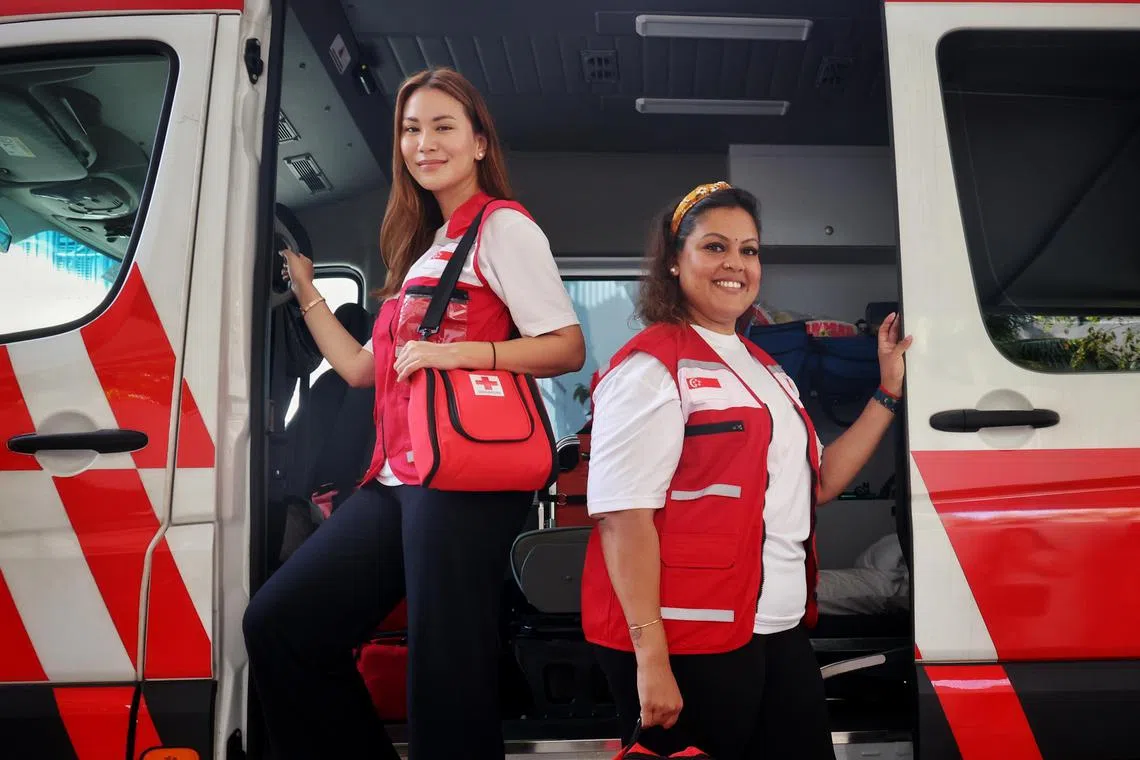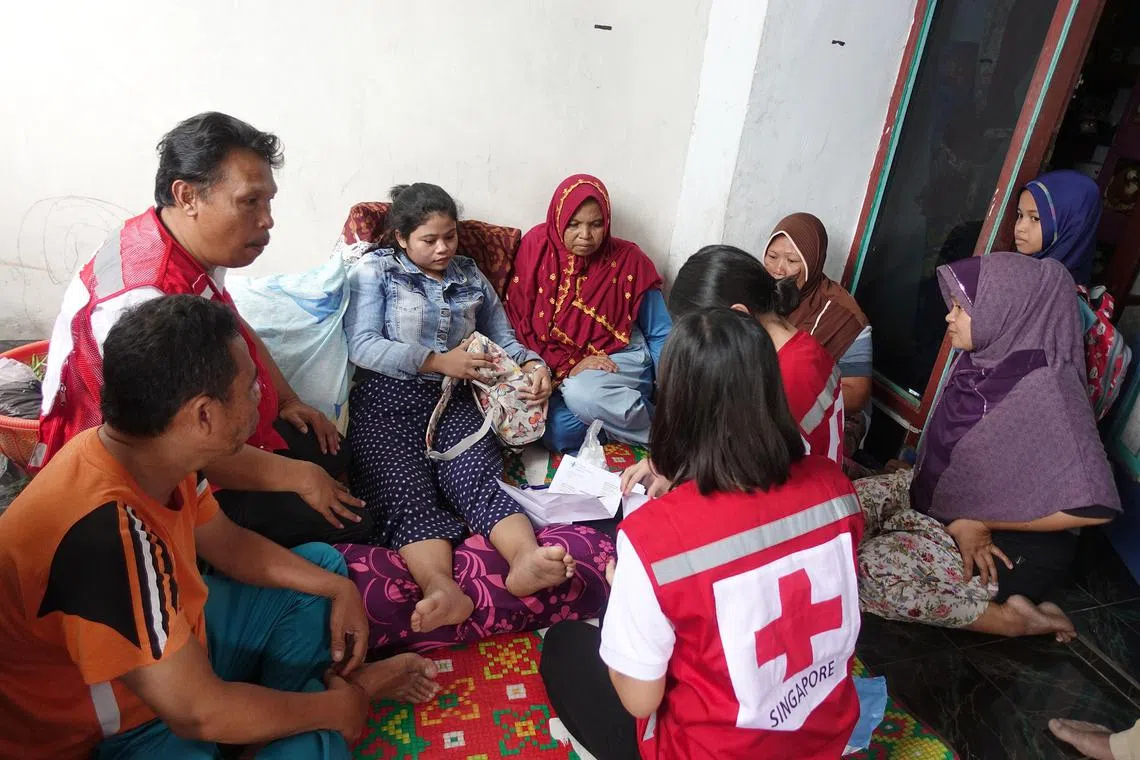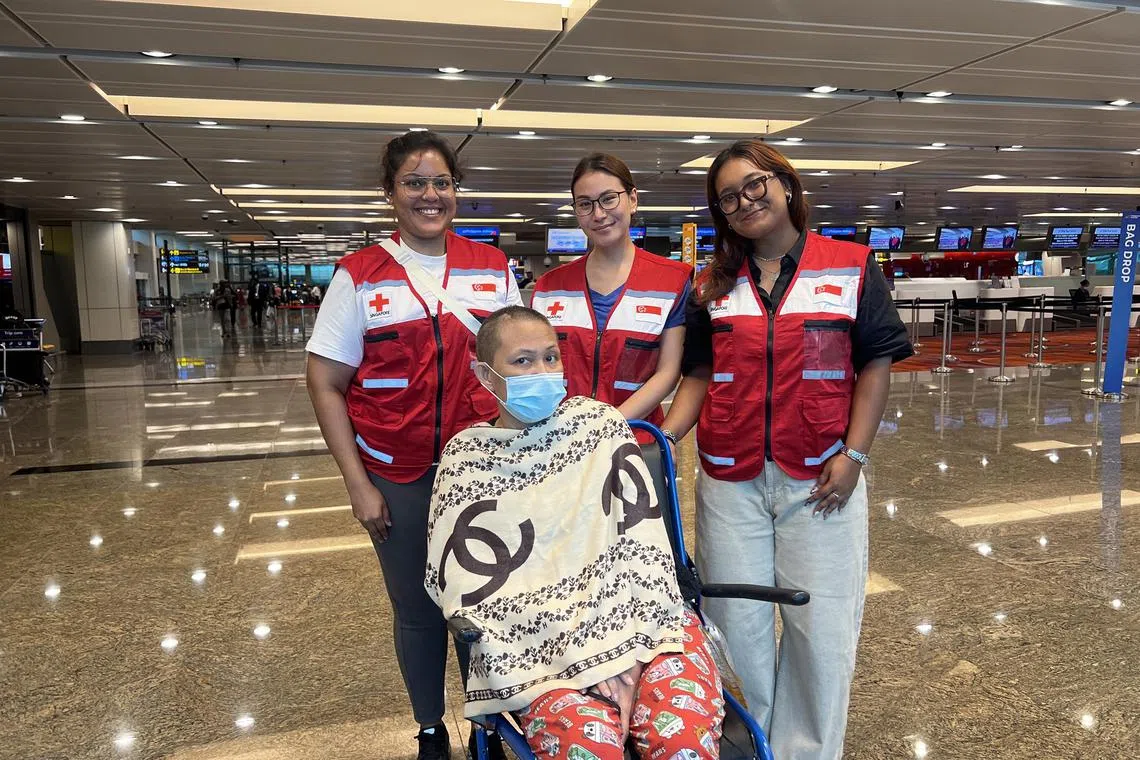S’pore Red Cross goes the extra mile to take ill, injured foreign workers back to their families
Sign up now: Get ST's newsletters delivered to your inbox

Ms Anisa Famy (left) and Ms Gayatri Murugasan are among about 100 Singapore Red Cross volunteers helping to accompany ill and injured foreign workers home.
ST PHOTO: JASON QUAH
Follow topic:
SINGAPORE – A maid who injured her spine after falling three storeys from her employer’s apartment in 2019 had to be sent home.
But she could not walk, much less board a plane alone.
Her journey would have been fraught with uncertainty had it not been for volunteers and staff from the Singapore Red Cross (SRC) who accompanied her to her village in Lombok, Indonesia.
They wheeled her onto the plane, helped her relieve herself when she could not stand, and made the six-hour journey by plane and ambulance to take her home.
This was one of the cases handled by SRC’s Last Mile Assistance Programme, which sends volunteers in pairs to accompany injured or sick foreign workers who have to be repatriated to their home countries.
The programme started in 2019, and since then has helped 12 maids and migrant workers return to countries including India, Indonesia and the Philippines.
This is the first time SRC is speaking to the media about the programme.
Its associate director for global engagement Rebekah Lim said the number of cases it handles annually has increased from about two in 2019 to five in 2024.
Interestingly, the programme was born after an SRC intern, Ms Lim En Qi, now 27, identified a gap in the repatriation process of such workers in 2018.
She told The Straits Times that she spoke to non-governmental organisations (NGOs), such as the Centre for Domestic Employees (CDE) and the Migrant Workers’ Centre (MWC), to learn about their work as SRC wanted to expand its range of beneficiaries to include migrant workers in Singapore.
“We realised the NGOs assisting migrant workers were largely focused on providing assistance locally. Given their scale, they were unable to extend their assistance beyond Singapore, other than raising funds,” she said.
She heard from the NGOs that there were injured and sick migrant workers who went home alone.
SRC executive Tan Jia Qi, who works on the programme, said these workers struggled with boarding the plane and moving their luggage. They also did not know about the treatment options back home.
Ms Tan said the NGOs were unsure if these workers returned home safely.
The programme now handles cases referred by the National Trades Union Congress’ (NTUC) Migrant Workers Segment, which comprises the CDE and MWC.
The SRC team visits the workers at hospitals to understand their medical needs, and takes about a week to make arrangements to assist their repatriation.
This includes finding volunteers, and informing the airline and airport about the workers’ special requirements.

The team includes (clockwise from left) executive Tan Jia Qi, associate director for global engagement Rebekah Lim, volunteers Anisa Famy and Gayatri Murugasan, and assistant head for international services Fauzia Amalia.
ST PHOTO: JASON QUAH
Ms Tan said: “I also coordinate with overseas Red Cross societies to arrange for medical transport upon arrival, and ensure all the logistics are settled before we send the workers back.”
The SRC team realised that what differentiated them from other organisations was their international reach.
Ms Lim En Qi said: “With SRC’s ability to transcend geographical boundaries, we found its niche in the ability to provide assistance in reuniting migrant workers with medical needs with their family members back home.”
SRC assistant head for international services Fauzia Amalia said they have about 100 volunteers – mostly doctors and nurses – but not all have been activated as the cases are usually on short notice.
Ms Fauzia and volunteer Anisa Famy, 33, handled the programme’s first case – the Indonesian helper with the spinal injury.
After SRC notified the airline of the helper’s condition, the airline arranged for a bus to take her to the back of the plane, so she could board more easily.
Ms Anisa helped the woman relieve herself at her seat on the plane with a plastic bag, while covering her with a blanket provided by an air stewardess.
Ms Anisa, who is a locum staff nurse at an international school, said: “We had to make do with what we had because she could not stand.”
The maid then went home in an ambulance provided by the Indonesian Red Cross.
About 80 villagers greeted them as the SRC volunteers explained her condition and follow-up treatment plan.
Ms Anisa said: “The family were very happy she was back home, and they could look after her.”
Ms Fauzia added: “It is wonderful to see so many people come together to assist the migrant workers in reuniting with their families after a distressing experience.”

Ms Fauzia Amalia and Ms Anisa Famy talking to the family of an Indonesian maid (in blue, third from left), who had suffered a spinal injury, about her medical condition.
PHOTO: SINGAPORE RED CROSS
In another case, the team took a 13-hour journey with a Filipino maid who had suffered a haemorrhagic stroke. She had trouble swallowing and speaking.
The journey in August 2024 consisted of a four-hour flight to Manila, a seven-hour layover, and a two-hour domestic flight to the maid’s home in General Santos City.
Ms Anisa and another volunteer, Ms Gayatri Murugasan, 33, a senior staff nurse at Tan Tock Seng Hospital, took turns to feed the maid her medication, as well as milk and water mixed with thickener.
Upon seeing her family at the airport, the maid finally smiled.

(From left) Singapore Red Cross volunteers Gayatri Murugasan and Anisa Famy and project coordinator Nazierah Ahmad Saakiran with a Filipina maid who had suffered a haemorrhagic stroke.
PHOTO: SINGAPORE RED CROSS
Ms Gayatri said: “She couldn’t express herself, but she was very, very happy to see her family. And that’s a ‘thank you’ (to us) in a way.”
Another family, in Tiruchirappalli, India, cried upon seeing their loved one return home from Singapore in August 2023 after suffering a cardiac arrest at work.
Although the man was well enough to fly home, SRC volunteers monitored him on the flight as his gait was unstable.
At the airport, his wife – who came with their two children – thanked the volunteers for bringing him home.
NTUC’s Migrant Workers Segment director Michael Lim said the collaboration with SRC safeguards the well-being of migrant workers in Singapore, and ensures their safe and dignified transition back home.
“We are grateful for SRC’s unwavering efforts and look forward to continuing this meaningful collaboration to better support the needs of migrant workers and migrant domestic workers,” he added.
Ms Lim, the intern who is now a final-year student at Duke-NUS Medical School, said: “I feel greatly heartened that this project has come to fruition and is helping migrant workers when they need it the most.”
She added: “It’s gratifying to see SRC use its scale to ensure that injured migrant workers are not forgotten after leaving Singapore and, instead, lifted in their darkest times.”
Christine Tan is a journalist at The Straits Times reporting on crime, justice and social issues in Singapore.


